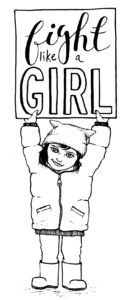Women stand for the true America
January 25, 2017
Half a million people gathered in our nation’s capitol. There was no service on the blocks they occupied.
It was Jan. 21 — a day that will be remembered in history as the day people came together, both physically and metaphorically, to march for humanity, in all its diversity and intersectionality.
They came from far and wide to march for the same rights the founding fathers fought for, the same rights suffragettes chained themselves to fences for, the same rights civil rights activists were killed for, the rights that the European immigrant travelled across an ocean for.
The right to the American dream.
The highways leading from Vermont to Washington D.C. before the march illustrate America. Once the highway reached the Maryland border with Washington, cars with license plates representing states near and far clustered in traffic.
[media-credit name=”Alyssa Handelman” align=”alignnone” width=”125″] [/media-credit]
[/media-credit]
Inside, Americans of all genders, races, classes, religions and nationalities looked on excitedly at the traffic, unphased by the delay.
It was not only a day, but the beginning of a moment. A moment of solidarity in the fight for equality for all. It was the most intersectional feminist march yet.
One UVM student said that one person’s liberation is tied up in the liberation of all. This is the truth that makes up the American dream’s foundation.
America’s literary history has been shown a deep fascination with the American Dream. Americans over the past years have contemplated whether this American Dream is possible for them because of the identities they hold.
Ta Nehisi-Coates, author of “Between the World and Me,” wrote of the American Dream as an ideal that held more oppression than it did liberation. Nehisi-Coates moved to Paris, and said he had never felt more American then he did there, away from America.
There was also a woman from New York, who voted for Donald Trump, because she felt that the dream had passed her by. She was not poor enough to qualify for aid, and not wealthy enough to pay for it without working overtime each week.
She said she felt heard by Trump, that she felt validated by him. She felt that the system worked. There was a transgender person, who felt dehumanized because they could not use the bathroom of the gender they identified with.
Each American has a different story on how the roadblocks to the reality of the American dream. These differences in our stories don’t negate our truth of a common American identity. These stories are the American identity.
These stories, and the rights that are put in place to help tell them, lead us to a more perfect union, and inspire action. When multiple truths exists together in the millions, the American dream is one person closer to a reality.
With all its greatness, the march also had its flaws.
There is a video of a woman expressing how she had been kicked out of the march because she was found to be a Trump supporter. She is 13.
The reality was that she came to walk with her sisters, but was denied that right because she differed in political alignment.
A large group of Americans are isolated, and denied the unity that makes us whole, we cannot achieve the dream so many have died for.
We call on the student body to strive for truth: a more inclusive and accepting story. We call on those to be humble enough to listen and not to accept that they know more than their peers.
We call on all to listen to each truth even when those disagree, to validate their struggle.
We also call on every person to be brave enough to express their truth, and kind enough to understand how to do so without hurting others.
We call on the students to embrace the beginning of this moment in history as a time to serve those who walk beside you, not by acting or speak- ing for them, but by listening to them and validating their experiences.
This is the moment of truth. In this moment, when we stand peacefully somewhere between our differences to understand the truth of the identity we all share: being American.






